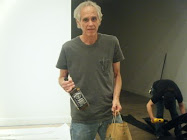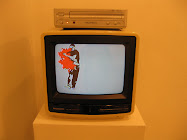Last Friday at the MFAH, in conjunction with Houston Collects African-American Art, Dr. John Franklin spoke in the Brown Auditorium to a packed house. The day was filled with talks with young and established artists but the hot ticket was that 10 am heavyweight of African-American Studies. He wrote the book on it, literally, with the 1947 From Slavery to Freedom. Social activists, artists, esteemed members of the black community and River Oaks collectors converged on the event in unexpected numbers, and I was one of the ones left outside.
It didn't help that I arrived right at 10. That was stupid but traffic sucks, yo. It was smart to wear a suit though. As I arrived a mob of about a hundred were shouting at guards, cajoling for standing room only space and flashing whatever angle they had.
"I need to sit down, I have a bad knee."
"We are friends of the family, let us in."
"We came all the way from..."
"I work at..."
"I was just in there and came out because I forgot my purse..."
I knew that I had only a slim hope of getting in and that I had to hold my cards as long as possible.
"Do you have any more room for press?"
"We are friends of the family, let us in."
"We came all the way from..."
"I work at..."
"I was just in there and came out because I forgot my purse..."
I knew that I had only a slim hope of getting in and that I had to hold my cards as long as possible.
"Do you have any more room for press?"
It usually works. Whether at the front door or sneaking around the back, it's an excuse that is ambiguous enough for anyone to whip it out and then disappear back into the ether. Try it sometime. It only took me 45 minutes to make it work.
First off my suit made me exempt from the security guards when they got tough and forced the crowd from an unruly mob into an unruly single file line. I stood next to a diminutive volunteer who probably expected an hour of handing out leaflets and pointing out the bathrooms. She was mistaken, and terribly disturbed by the scene around her. After I introduced myself as a writer she graciously repeated her name and didn't mind as I ignored the guards by standing on the wrong side of the wall directly next to the entrance. I had an ally.
"They're not leaving." she managed to squeeze the whisper out of the side of her mouth as she kept smiling.
"Well, they know that the first 'No' doesn't really mean No."
"But there's no room in there."
"Yup, that's true..." I trailed off as I hoped she wouldn't associate my incredulity with theirs, and she didn't.

Something you might find while googling "from slavery to freedom"
"Well, they know that the first 'No' doesn't really mean No."
"But there's no room in there."
"Yup, that's true..." I trailed off as I hoped she wouldn't associate my incredulity with theirs, and she didn't.
Something you might find while googling "from slavery to freedom"
A tall white dude tried to sidle in on my action, backing into the tiny corner between the door and a table full of From Slavery to Freedom. "I know you're getting in, I'm standing here." We made small chit-chat as I crossed him off of the list of people who would be getting in. Eventually he succumbed to the waving arms and booming voice of the blue blazer security, but I was oblivious to the call- engaged in a surprisingly tantalizing conversation with my volunteer ally.
"They won't leave." It started the same as the last time. "Why won't they leave?"
"Well that's the third time that they've been told 'No', I think they might start leaving."
Three children sprinted in front of us. "Why would you bring children here?"
I had to hedge my response. "I don't know. I guess that they want to let their children hear him speak." She clucked, and I was amazed at the way the conversation turned.
"...and they're all gonna vote for Obama."
Screw hedging. It might get me kicked off the fast track to the lecture, but it was already half over anyway.
"Yes, they will vote for Obama. I've voting for him too."
"Well that's the third time that they've been told 'No', I think they might start leaving."
Three children sprinted in front of us. "Why would you bring children here?"
I had to hedge my response. "I don't know. I guess that they want to let their children hear him speak." She clucked, and I was amazed at the way the conversation turned.
"...and they're all gonna vote for Obama."
Screw hedging. It might get me kicked off the fast track to the lecture, but it was already half over anyway.
"Yes, they will vote for Obama. I've voting for him too."
This was obviously going too far. I was in danger of being recognized as not a Texan, which most of the inner loop is anyway, but I am supremely aware myself that a Pace commercial could be around the corner at any moment- with the phrase New York City! followed quickly by a lasso around my shoulders or a horse kicking me in the ass. She raised an eyebrow and I bridged the divide between us. "Do you like John McCain?"
"We need someone who can protect us, what has Obama done? He was in the Senate for three years."
I felt no need to hold back from a non sequitur.
"C'mon, John McCain? We lost the Vietnam War you know."
She wasn't expecting that. "Well what do you like about him?"
"He's smart. I like his ideas. I like him. He's a orator." I felt good about that, justified.
"Well... I don't know... I hope he doesn't win, but he has such a wonderful personality."
I felt no need to hold back from a non sequitur.
"C'mon, John McCain? We lost the Vietnam War you know."
She wasn't expecting that. "Well what do you like about him?"
"He's smart. I like his ideas. I like him. He's a orator." I felt good about that, justified.
"Well... I don't know... I hope he doesn't win, but he has such a wonderful personality."
That surprising verdict seemed like the best I was ever going to get out of this Texan, and I was proud as hell. A few seconds later I saw a lady with a handful of MFAH stickers in a becoming black dress darting into the auditorium and I took my shot...
"Do you have any more room for press?"
Thankfully it worked, and I slid in under the hot gaze of dozens of worthy patrons hoping to be the next exception to the rule.
The room auditorium was packed, but I parked my ass on the back wall where I could see the diminutive figure in a brown-gray suit (I don't know what color it was, I was really far away) from over someone's shoulder. Even though I missed half the lecture it seemed like Dr. Franklin started exactly when I entered the room. He spoke about his first dip into the intoxication of collecting artwork in India, then about a shift, a need to collect African-American artwork and spend his money on his own cultural heritage.
A trip to Africa brought Franklin into contact with a Nigerian sculptor that he grew to adore. It was during the honeymoon of Nigerian independence after 1960, and the United States had sent a contingent to the African nation to assist with building a democratic bureaucracy. A similar program brought Barack Obama's father to the United States from Kenya in 1959, unmentioned by Dr. Franklin.

Aaron Douglas, An Idyll of the Deep South, 1934
The professor, employed first at Brooklyn College and then at the University of Chicago, developed a love for African-American modernists and told stories of acquiring Romare Bearden and Aaron Douglas masterpieces. He even dodged the Bearden estate when he had failed to pay the artist for a work. The crowd cooed and occasionally hollered, by the end of the lecture another dozen had talked themselves into the room and were blocking the aisles and staircases with abandon. Peter Marzio flashed them pearly whites and asked the audience for questions. A woman politely stood and praised the professor, asking for his collection to be given a place in the MFAH, for we all would like to see it. The Q and A took a sharp turn after that.
I saw her bolt up as the crowd was clapping. She was about ten rows in front of me and had a red swath of fabric jutting up a foot taller than her hair. She waved a wide reed fan in front of her face, and was clothed in a matching red dashiki. By the time Ms. Polite was finished she had lumbered right up to the stage, and she began shouting. The beginning was muffled, but she walked right up to the speaker, waving her fan like it was an involuntary muscle. She grabbed his microphone.
The room auditorium was packed, but I parked my ass on the back wall where I could see the diminutive figure in a brown-gray suit (I don't know what color it was, I was really far away) from over someone's shoulder. Even though I missed half the lecture it seemed like Dr. Franklin started exactly when I entered the room. He spoke about his first dip into the intoxication of collecting artwork in India, then about a shift, a need to collect African-American artwork and spend his money on his own cultural heritage.
A trip to Africa brought Franklin into contact with a Nigerian sculptor that he grew to adore. It was during the honeymoon of Nigerian independence after 1960, and the United States had sent a contingent to the African nation to assist with building a democratic bureaucracy. A similar program brought Barack Obama's father to the United States from Kenya in 1959, unmentioned by Dr. Franklin.

Aaron Douglas, An Idyll of the Deep South, 1934
The professor, employed first at Brooklyn College and then at the University of Chicago, developed a love for African-American modernists and told stories of acquiring Romare Bearden and Aaron Douglas masterpieces. He even dodged the Bearden estate when he had failed to pay the artist for a work. The crowd cooed and occasionally hollered, by the end of the lecture another dozen had talked themselves into the room and were blocking the aisles and staircases with abandon. Peter Marzio flashed them pearly whites and asked the audience for questions. A woman politely stood and praised the professor, asking for his collection to be given a place in the MFAH, for we all would like to see it. The Q and A took a sharp turn after that.
I saw her bolt up as the crowd was clapping. She was about ten rows in front of me and had a red swath of fabric jutting up a foot taller than her hair. She waved a wide reed fan in front of her face, and was clothed in a matching red dashiki. By the time Ms. Polite was finished she had lumbered right up to the stage, and she began shouting. The beginning was muffled, but she walked right up to the speaker, waving her fan like it was an involuntary muscle. She grabbed his microphone.
"I want you to know that I am one of two surviving students who sued HISD to test Brown v. Topeka [Board of Education] in Texas, and I just want to say thank you."
The crowd roared.
"And I also want you girls out there to know that he's still single, and I'm 66 and just want to give you a kiss."
They roared with laughter.
The crowd roared.
"And I also want you girls out there to know that he's still single, and I'm 66 and just want to give you a kiss."
They roared with laughter.
Marzio thanked his speaker as the lady moved in for a peck. The crowd began the steep decent out of the auditorium, and I wandered the James Turrell tunnel, the forest at Fountainebleau and Houston Collects African-American Art, all unencumbered by permission to be there- under the inalienable cover of a nice suit.

























2 comments:
i'm an orator too when i have a teleprompter :P
yeah, but you're ugly as all hell :I
Post a Comment